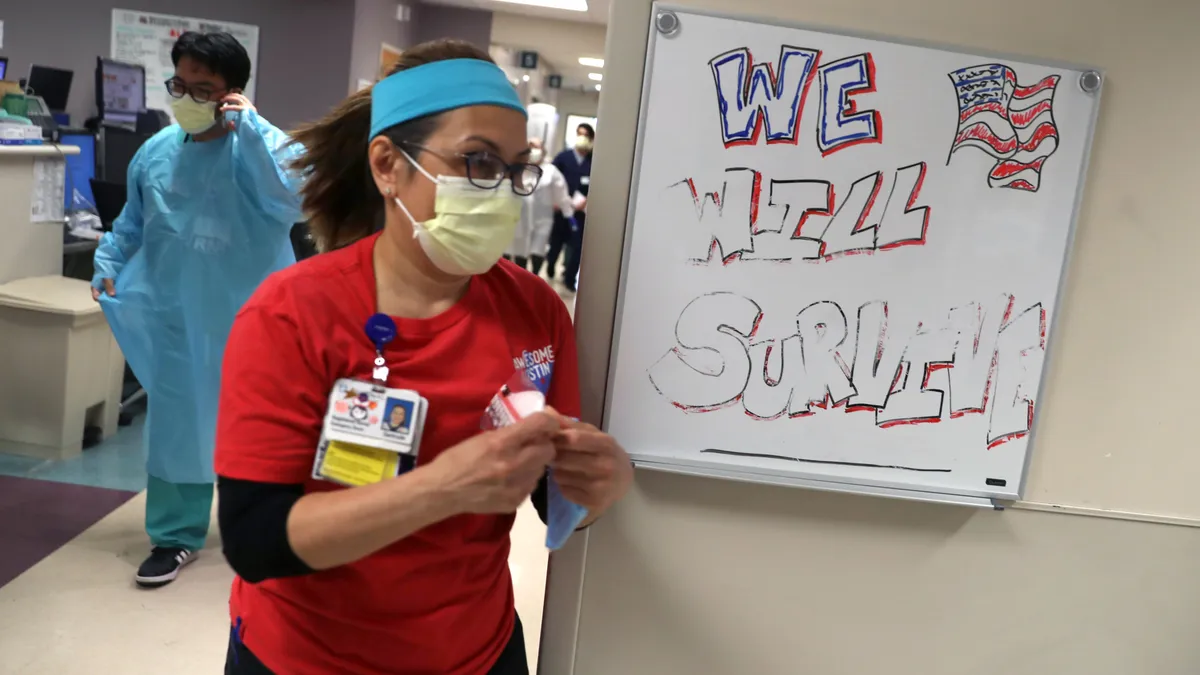Dive Brief:
- A non-solicitation agreement between two healthcare staffing agencies in California was necessary to their collaboration and therefore not a violation of federal law, a 9th U.S. Circuit Court of Appeals panel ruled (Aya Healthcare Services, Inc. v. AMN Healthcare, Inc., No. 20-55679 (9th Cir., Aug. 19, 2021)).
- AMN Healthcare provided travel nurses to hospitals. Its business became so robust it contracted with a newer staffing agency, Aya Healthcare, to which it referred spillover assignments. This contract included a provision that prohibited Aya from soliciting AMN's employees. Five years after the businesses partnered, in 2015, Aya began soliciting AMN's travel nurse recruiters, according to court documents. The relationship soured, and the businesses split.
- Aya sued AMN in 2017, alleging the larger business violated the Sherman Antitrust Act and California state law. A district court granted AMN summary judgment, a ruling the 9th Circuit upheld.
Dive Insight:
On appeal, Aya argued AMN's non-solicitation provision may have constituted a naked no-poaching restraint. It also contended that the business "effectively 'cartelized' the labor market and retaliated against Aya." As for its state claims, the district court declined to exercise supplemental jurisdiction over them in 2020, and the business did not reference them on appeal.
The appellate court determined that the provision was not a naked restraint. It also decided that AMN did not need to satisfy a less-restrictive-means test to demonstrate that its agreement was ancillary, rather than naked — an opinion that ran contrary to that expressed by the U.S. in an amicus brief it filed earlier.
With the Biden administration now in place, the U.S. has taken a more active stance on competition. In a July 9 executive order, President Joe Biden encouraged the Federal Trade Commission to ban or limit the use of non-compete agreements, as well as the use of "unnecessary occupational licensing restrictions that impede economic mobility." The order came as part of a broader initiative to target barriers to economic competition in several industries, including healthcare. The White House indicated such moves would help workers change jobs and obtain better pay.
The 9th Circuit provided a helpful breakdown of the language frequently used to discuss issues of competition in its opinion. The Sherman Act outlaws unreasonable restraints of trade or commerce, the court explained. These restraints generally fall into two categories: horizontal restraints and vertical restraints. "A horizontal restraint is 'an agreement among competitors on the way in which they will compete with one another,'" the court said. "Vertical restraints are 'restraints 'imposed by agreement between firms at different levels of distribution.''"
Courts use two separate standards for the two types of restraints when they must determine whether an agreement is unreasonable — the standard the law invokes. For vertical restraints, courts use the "rule of reason," a factual inquiry that weighs justifications for a restraint against anti-competitive effects. For horizontal restraints, courts call upon the "per se standard," which holds that "a small group of restraints are unreasonable per se because they always or almost always restrict competition and decrease output."
But courts can analyze some horizontal restraints a different way. The "ancillary restraints" doctrine holds that a horizontal restraint can be exempt from the per se rule and analyzed under the rule of reason if it meets two requirements: "it must be subordinate and collateral to a separate, legitimate transaction"; and it must be "reasonably necessary to achieving the transaction's pro-competitive purpose."
Lastly, the court distilled the difference between naked restraints and ancillary restraints. "A restraint is naked if it has 'no purpose except stifling of competition,'" it said. Because naked restraints are categorically separate from ancillary restraints, they must be analyzed under the per se standard.
All of this information leads to the central questions of Aya's appeal: Whether the restraint set up in its contract with AMN was naked or ancillary and whether it was subject to the per se standard or the rule of reason standard. The district court found that the agreement fell in the ancillary category — "AYA admitted in its declarations that the agreement was 'part of a collaboration agreement to fulfill the demand of hospitals for travel nurses.'"
The 9th Circuit agreed, finding that the restraint was a necessary part of the "pro-competitive collaboration" between the parties. "Without the restraint, AMN 'would likely be less willing or unwilling to deal with other agencies to supply travel nurses to hospitals which, as Aya also recognized, already experience a 'chronic shortage of nurses,'" the court opined.














